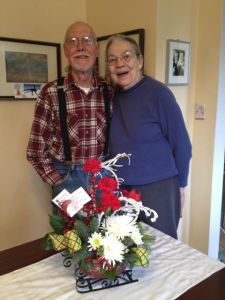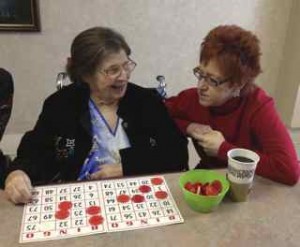
by Diane Masson | Feb 15, 2015

Bill and Amy in 2012
Aging parent’s decisions can drive us crazy or make us sick. When a parent with dementia stubbornly chooses to stay home, it can be heart breaking for the adult children. Watching a senior’s vitality fade is hard enough. But for an adult child to witness a parent’s poor hygiene, lack of nutrition by eating frozen dinners (not fresh food) and to see the absence of good judgment is tough and sad.
Some of us never get sick. Yet here I am, literally worried sick about my in-laws. A month ago my father-in-law, Bill, had a heart attack. My mother-in-law, Amy, with dementia was left alone for the majority of three days and nights as the local children rallied around the dad at the hospital. They did make sure she had food and medications. My husband and I hired a geriatric nurse to evaluate and help Amy. The nurse was to be our eyes and ears, since we live 1000 miles away. By the time the nurse intervened, Amy had become psychotic and had trouble recognizing her own children.
To make a long story short – my father-in-law never wanted to move to a retirement community or assisted living. He actually told my husband and I (working in the senior living business) that he understood that he would be waiting for a health crisis.
Well a crisis is one parent in the hospital and we had two. Over the last month, Bill improved enough to graduate from the hospital, to rehabilitating in skilled nursing care, to living permanently with his adult daughter in her home. He was told by professionals that he could no longer be Amy’s caregiver (he had been her caregiver for five years) and would need help for himself 24-hours a day. Pneumonia and a fall preceded the heart attack and now he has trouble catching his breath if he overexerts himself in any way and can’t remember to take his own medications because of dementia.
Let me fast forward on Amy’s simultaneous crisis. Amy’s Alzheimer’s prevented her from grasping that her husband of 65 years was in the hospital. She eloped (I think she walked away to search for her missing husband and ultimately the police found her) and hit a nurse in her confusion and anxious state. The police took her to the hospital and she resided in the emergency room for two days because they did not have a bed in the locked area. This is the part I don’t even want to imagine because I know they must have had to sedate her completely because she was an elopement risk.
A week later, both the skilled nursing community where Bill was getting rehab and the hospital where Amy resided wanted to discharge them simultaneously. The local children said that was impossible and they had to be discharged one at a time. So Bill was released first. Our goal was to have Amy placed in a quality secured memory care by the end of the next week. That week ended two days ago on Friday. Now it’s a holiday weekend and she is stuck in a locked psych ward in a hospital. Amy could have been discharged on Friday afternoon. The injustice of it all has made me sick. Next week I will share why Amy was not released – you will be shocked and disgusted.
Diane Masson’s new guide book for seniors, “Your Senior Housing Options,” will be will be coming soon to Amazon.com. If you sign up for my weekly newsletter on the right side of this blog, you will be notified when my new book becomes available. Check out my new website: Tips2Seniors.com or please follow me on Facebook.
Diane Twohy Masson is the author of “Senior Housing Marketing – How to Increase Your Occupancy and Stay Full,” available at Amazon.com with a 5-star rating. The book is required reading at George Mason University as a part of its marketing curriculum. Within this book, the author developed a sales & marketing method with 12 keys to help senior living providers increase their occupancy. Masson developed this expertise as a marketing consultant, sought-after blogger for senior housing and a regional marketing director of continuing care retirement communities in several markets. She has also been a corporate director of sales and a mystery shopper for independent living, assisted living, memory care and skilled care nursing communities in multiple states. Currently, Masson is setting move-in records as the regional marketing director of two debt-free Continuing Care Retirement Communities in Southern California – Freedom Village in Lake Forest and The Village in Hemet, California. Interestingly, this career started when she was looking for a place for her own mom and helped her loved one transition through three levels of care.
© Marketing 2 Seniors| Diane Twohy Masson 2015 All Rights Reserved. No part of this blog post may be reproduced, copied, modified or adapted, without the prior written consent of the author, unless otherwise indicated for stand-alone materials. You may share this website and or it’s content by any of the following means: 1. Using any of the share icons at the bottom of each page. 2. Providing a back-link or the URL of the content you wish to disseminate. 3. You may quote extracts from the website with attribution to Diane Masson CASP and link https://www.marketing2seniors.net For any other mode of sharing, please contact the author Diane Masson.

by Diane Masson | Jan 25, 2015
 Which scenario describes your senior living community? I called three memory care communities in Seattle and got very different responses.
Which scenario describes your senior living community? I called three memory care communities in Seattle and got very different responses.
Community A – answered the phone in two rings. I shared my need to find immediate placement for my mother-in-law with Alzheimer’s. Their memory care was 100% full with a waiting list. Sandy was extremely helpful and suggested another community. Special shout out and thanks to Sandy! It is no surprise that you are full.
Community B – answered the phone within two rings, but mumbled something to me. I asked them to repeat it, because I did not understand one word. Then I shared my situation. The person said they would put me through to someone who would help me. Suddenly I was in a voicemail box. What? I left a full crisis message with my name and number. They have not called me back and it has been five days.
Community C – answered the phone within three rings. They heard my crisis story and said the person I needed to speak to was not available but they would text them regarding this emergency. The lady on the phone promised me that they would call me back that day. The admissions person called me back within an hour and we started working on a plan of action for my mother-in-law.
This is a real situation for my family to place my mother-in-law with Alzheimer’s immediately.
Congratulations to all three communities in Seattle, WA who all answered their phones within a couple of rings. Community B, put me through to a voicemail when I was in crisis mode. Are you kidding me? That is heartless. Take my name and number and have a real person call me back as soon as possible. The majority of people hang up when pushed into voicemail. Don’t use it.
Diane Twohy Masson is the author of “Senior Housing Marketing – How to Increase Your Occupancy and Stay Full,” available at Amazon.com with a 5-star rating. The book is required reading at George Mason University as a part of its marketing curriculum. Within this book, the author developed a sales & marketing method with 12 keys to help senior living providers increase their occupancy. Masson developed this expertise as a marketing consultant, sought-after blogger for senior housing and a regional marketing director of continuing care retirement communities in several markets. She has also been a corporate director of sales and a mystery shopper for independent living, assisted living, memory care and skilled care nursing communities in multiple states. Currently, Masson is setting move-in records as the regional marketing director of two debt-free Continuing Care Retirement Communities in Southern California – Freedom Village in Lake Forest and The Village in Hemet, California. Interestingly, this career started when she was looking for a place for her own mom and helped her loved one transition through three levels of care.
© Marketing 2 Seniors| Diane Twohy Masson 2014 All Rights Reserved. No part of this blog post may be reproduced, copied, modified or adapted, without the prior written consent of the author, unless otherwise indicated for stand-alone materials. You may share this website and or it’s content by any of the following means: 1. Using any of the share icons at the bottom of each page. 2. Providing a back-link or the URL of the content you wish to disseminate. 3. You may quote extracts from the website with attribution to Diane Masson CASP and link https://www.marketing2seniors.net For any other mode of sharing, please contact the author Diane Masson.

by Diane Masson | Mar 16, 2014

Do They Feel Harshly Criticized?
“Critique” and “evaluate” are two simple words but often misconstrued by the receiver.
In a recent team meeting, one department head described how one of her staff cries every time she tries to critique her. This makes it very difficult for this supervisor to work with her employee. The senior living team brainstormed together. Another department head said that it really should be called “evaluating performance” of the staff member and not critiquing.
It is the responsibility of supervisors in senior living communities to continually evaluate his or her residents and document everything (particularly in skilled nursing care, assisted living and memory care). It sounds so simple, yet when a supervisor starts evaluating the caregiver providing the care to the resident…it can be misinterpreted as harsh criticism.
Hopefully, supervisors continually critique themselves and try to improve their own coaching skills. How is a supervisor approaching an employee to administer an evaluation or yearly review? Everyone has different personalities and some supervisor’s direct approach can be confrontational to another personality type. Our marketing team just read, “How to Win Friends and Influence People,” by Dale Carnegie. It is an excellent book on how to interact with other employees. Evaluations should be capitalized on as a teaching opportunity, so the evaluated employee can continually improve.
Can you share how you evaluate your senior living employees? How do you handle an employee who reacts negatively and turns the performance improvement plan into a personal attack on them?
Please share your successes, failures or comment below to join the conversation and interact with other senior living professionals on what is currently being effective to increase occupancy on a nationwide basis.
Diane Twohy Masson is the author of “Senior Housing Marketing – How to Increase Your Occupancy and Stay Full,” available at Amazon.com with a 5-star rating. The book is required reading at George Mason University as a part of its marketing curriculum. Within this book, the author developed a sales & marketing method with 12 keys to help senior living providers increase their occupancy. Masson developed this expertise as a marketing consultant, sought-after blogger for senior housing and a regional marketing director of continuing care retirement communities in several markets. She has also been a corporate director of sales and a mystery shopper for independent living, assisted living, memory care and skilled care nursing communities in multiple states. Currently, Masson is setting move-in records as the regional marketing director of two debt-free Continuing Care Retirement Communities in Southern California – Freedom Village in Lake Forest and The Village in Hemet, California. Interestingly, this career started when she was looking for a place for her own mom and helped her loved one transition through three levels of care.
© Marketing 2 Seniors| Diane Twohy Masson 2013 All Rights Reserved. No part of this blog post may be reproduced, copied, modified or adapted, without the prior written consent of the author, unless otherwise indicated for stand-alone materials. You may share this website and or it’s content by any of the following means: 1. Using any of the share icons at the bottom of each page. 2. Providing a back-link or the URL of the content you wish to disseminate. 3. You may quote extracts from the website with attribution to Diane Masson CASP and link https://www.marketing2seniors.net For any other mode of sharing, please contact the author Diane Masson.

by Diane Masson | Dec 22, 2013

Mom and Diane
Here is a shout out to all the special senior living employees who are working on Christmas this year. Every Boomer child who cares about his or her parent appreciates your dedication.
You may be cooking or serving the grand holiday buffet in an Independent Living Community, passing medications in an Assisted Living Community, calming anxiety in a Memory Care Community or providing 24-hour care in a Skilled Nursing – Thank You!
This Christmas, my mom is in Freedom Village Health Care Center. When I visited her on Thanksgiving morning, I saw smiles and joy in the eyes of the skilled nursing staff. Today, I am grateful that quality staff surrounds her and that she will be savoring her favorite coffee on Christmas morning.
Are you working on Christmas this year? Share your community name and what you do! Let’s spread some Christmas cheer!
Diane Twohy Masson is the author of “Senior Housing Marketing – How to Increase Your Occupancy and Stay Full,” available at Amazon.com with a 5-star rating. The book is required reading at George Mason University as a part of its marketing curriculum. Within this book, the author developed a sales & marketing method with 12 keys to help senior living providers increase their occupancy. Masson developed this expertise as a marketing consultant, sought-after blogger for senior housing and a regional marketing director of continuing care retirement communities in several markets. She has also been a corporate director of sales and a mystery shopper for independent living, assisted living, memory care and skilled care nursing communities in multiple states. Most recently Masson was recruited to consult for two debt-free Continuing Care Retirement Communities in Southern California – Freedom Village in Lake Forest and The Village in Hemet, California. Interestingly, this career started when she was looking for a place for her own mom and helped her loved one transition through three levels of care.
© Marketing 2 Seniors| Diane Twohy Masson 2013 All Rights Reserved. No part of this blog post may be reproduced, copied, modified or adapted, without the prior written consent of the author, unless otherwise indicated for stand-alone materials. You may share this website and or it’s content by any of the following means: 1. Using any of the share icons at the bottom of each page. 2. Providing a back-link or the URL of the content you wish to disseminate. 3. You may quote extracts from the website with attribution to Diane Masson CASP and link https://www.marketing2seniors.net For any other mode of sharing, please contact the author Diane Masson.

by Diane Masson | Dec 1, 2013
 Are you fighting with prospective residents who are in denial? I don’t mean physical punches… After they ask a question or make a comment, are you coming at them with a quick verbal rebuttal? Stop it!!! Many senior living sales people don’t even realize that they are arguing with the prospective resident.
Are you fighting with prospective residents who are in denial? I don’t mean physical punches… After they ask a question or make a comment, are you coming at them with a quick verbal rebuttal? Stop it!!! Many senior living sales people don’t even realize that they are arguing with the prospective resident.
It can be very difficult to evaluate yourself and recognize your own faults. Do the best you can to catch yourself saying a “but” or ask a co-worker/supervisor to listen to one of your tours. When the prospective senior says something like, “I love my home and can’t see myself moving.” I have heard sales people say, “But…you don’t see how wonderful life could be here.” Or a senior says, “I am doing fine in my own home.” (They can barely walk and you recognize an unsafe situation for them living at home.)
The prospective senior is in denial. It is so common. Don’t fight them, they will just get irritated and go to your competitor down the road. There are three easy solutions to deal with denial.
1) Ignore the senior’s denial and keep educating them on the benefits of living at your community. I don’t mean – shoving it in their face. Some seniors have so much denial that it could take them months or a few years to recognize the benefits of living at your senior living community. Keep inviting them to events. Eventually they can see the lifestyle in your independent or Continuing Care Retirement Community is better than living in their own home.
2) If you work in an assisted living or memory care community, time may be of the essence with a need driven situation. Get the phone numbers for the adult children and work through them. A strong Boomer child, who understands that his or her mom or dad is unsafe, can create a 48 hour or one week move in for the parent. Invite the children to dine at your retirement community with the parent. It’s magical, how quickly they select an apartment and put down a deposit.
3) When they say, “I love my home with the 180 degree view of the water and mountain.” Don’t interrupt! Let them go on for five minutes or more about their lovely home. Then causally say, “ Your home sounds lovely, why are you here?” Whatever comes out of their mouth is the real reason. Now it is up to you to provide a solution and collect a deposit.
Remember that everyone walks in the door of your retirement community for a reason. Yes, they can be in denial, but they came to you. Help them, by listening and exploring an implied need. Then provide a solution – gently…
Please share your successes, failures or comment below to join the conversation and interact with other senior living professionals on what is currently being effective to increase occupancy on a nationwide basis.
Diane Twohy Masson is the author of “Senior Housing Marketing – How to Increase Your Occupancy and Stay Full,” available at Amazon.com with a 5-star rating. The book is required reading at George Mason University as a part of its marketing curriculum. Within this book, the author developed a sales & marketing method with 12 keys to help senior living providers increase their occupancy. Masson developed this expertise as a marketing consultant, sought-after blogger for senior housing and a regional marketing director of continuing care retirement communities in several markets. She has also been a corporate director of sales and a mystery shopper for independent living, assisted living, memory care and skilled care nursing communities in multiple states. Most recently Masson was recruited to consult for two debt-free Continuing Care Retirement Communities in Southern California – Freedom Village in Lake Forest and The Village in Hemet, California. Interestingly, this career started when she was looking for a place for her own mom and helped her loved one transition through three levels of care.
© Marketing 2 Seniors| Diane Twohy Masson 2013 All Rights Reserved. No part of this blog post may be reproduced, copied, modified or adapted, without the prior written consent of the author, unless otherwise indicated for stand-alone materials. You may share this website and or it’s content by any of the following means: 1. Using any of the share icons at the bottom of each page. 2. Providing a back-link or the URL of the content you wish to disseminate. 3. You may quote extracts from the website with attribution to Diane Masson CASP and link https://www.marketing2seniors.net For any other mode of sharing, please contact the author Diane Masson.

by Diane Masson | Oct 13, 2013
 It can be so simple to alleviate someone’s fear by giving a simple explanation of what to expect in the coming minutes or hour. If you skip this simple step at your senior living community – learn what can happen.
It can be so simple to alleviate someone’s fear by giving a simple explanation of what to expect in the coming minutes or hour. If you skip this simple step at your senior living community – learn what can happen.
Yesterday, I was at the dentist for a routine crown. I received a crown 20 years ago and had no bad memories or fears coming to the appointment. Once I signed that I would pay for the crown, there was zero explanation of what would happen next…
It was tough hearing, feeling and smelling procedures in my mouth with zero knowledge of the reason. Could he have not taken a moment for some quick explanations to elevate the fear of the unknown? The dentist did warn me about the pounding that was about to come. That was my only warning. He asked me to open up and bite down on something squishy, then he just walked away and left me. What was in my mouth and why? Well it turned out to be a crown mold that needed to set in my mouth for 8 minutes. When the dentist came back, I had pretty much made a decision to never go to this dentist again.
When a prospective senior resident arrives at your senior living community, they can have fears. A senior can fear being sold, giving up his or her home of 40 years, change in lifestyle, losing the size or view of the current home, downsizing, moving, mortality, being accepted by other residents, losing control and etc.
Simply take two minutes before touring a prospective senior resident and share what can happen on the visit. Then ask for his or her permission to proceed. Watch them visibly relax before your eyes.
Maybe you say something like, “Today, you will have an opportunity to learn what our retirement community (assisted living, skilled nursing care, memory care or Continuing Care Retirement Community) has to offer and to see if this community could possibly be an option for you in your future. Why don’t we take a few minutes to determine what is most important for you to learn today and then I can determine what areas of the community to show you first. This will save you a lot of time. My goal will be to answer all your questions as we tour the community and see a model home. When you leave today, I will give you a brochure with all the floor plans and pricing included. How does that sound to you?”
Relaxed seniors buy and stressed seniors go to the next senior living community who will relax them. What do you say or do to relax your perspective residents at the beginning of a walk-in tour or appointment?
Please share your success, failures or comment below to join the conversation and interact with other senior living professionals on what is currently being effective to increase occupancy on a nationwide basis.
Diane Twohy Masson is the author of “Senior Housing Marketing – How to Increase Your Occupancy and Stay Full,” available at Amazon.com with a 5-star rating. The book is required reading at George Mason University as a part of its marketing curriculum. Within this book, the author developed a sales & marketing method with 12 keys to help senior living providers increase their occupancy. Masson developed this expertise as a marketing consultant, sought-after blogger for senior housing and a regional marketing director of continuing care retirement communities in several markets. She has also been a corporate director of sales and a mystery shopper for independent living, assisted living, memory care and skilled care nursing communities in multiple states. Most recently Masson was recruited to consult for two debt-free Continuing Care Retirement Communities in Southern California – Freedom Village in Lake Forest and The Village in Hemet, California. Interestingly, this career started when she was looking for a place for her own mom and helped her loved one transition through three levels of care.
© Marketing 2 Seniors| Diane Twohy Masson 2013 All Rights Reserved. No part of this blog post may be reproduced, copied, modified or adapted, without the prior written consent of the author, unless otherwise indicated for stand-alone materials. You may share this website and or it’s content by any of the following means: 1. Using any of the share icons at the bottom of each page. 2. Providing a back-link or the URL of the content you wish to disseminate. 3. You may quote extracts from the website with attribution to Diane Masson CASP and link https://www.marketing2seniors.net For any other mode of sharing, please contact the author Diane Masson.






